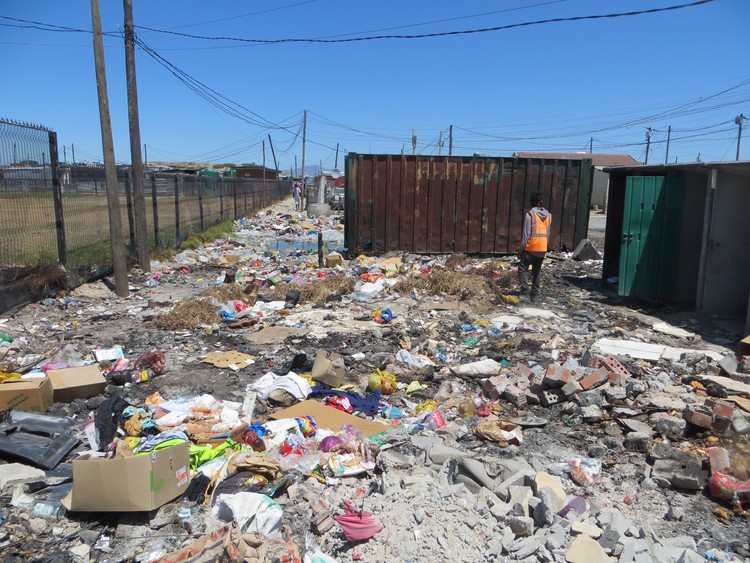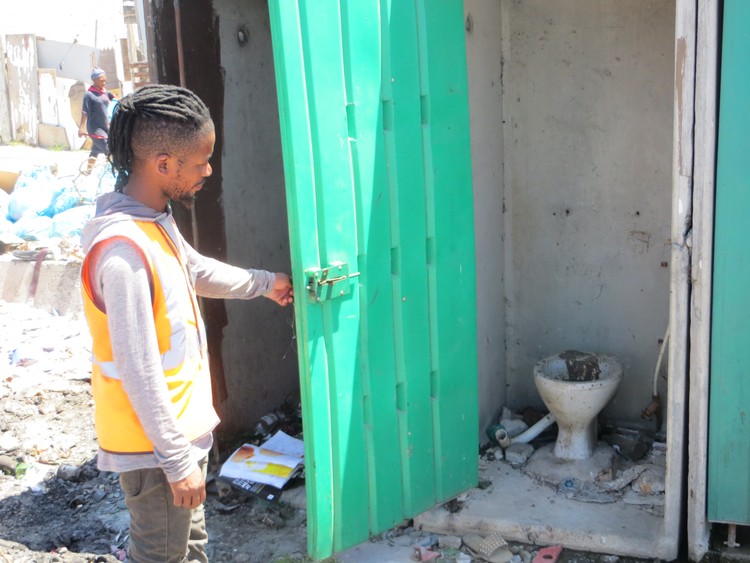Rubbish piles up in growing Mfuleni settlements
More families moved onto land during Covid
Rubbish is scattered along the fence of Nal’ikamva Primary School in Mfuleni, near the community of Strong Yard. Across from the fence is a row of toilets filled with excrement and rubbish. Photos: Vincent Lali
- Residents of Strong Yard in Mfuleni want the City of Cape Town to provide more cleaners and refuse bags to deal with the piles of waste in the area.
- They also claim that the communal toilets have been dirty for weeks.
- The shack dwellers say that the community’s growing population and the development of a new informal settlement has strained resources.
- The City of Cape Town says a new contractor was appointed to supply refuse bags at the end of December and “the area will receive full cleaning service”.
Discarded food, dead dogs and old furniture lie in the piles of rubbish scattered along the fence of Nal’ikamva Primary School in the neighbourhood of Strong Yard, Mfuleni. Across from the fence is a row of toilets filled with excrement and rubbish.
Residents want the City of Cape Town to provide more cleaners and refuse bags to deal with the waste in the area. They say the toilets have been dirty for weeks.
Strong Yard settlement was started by former backyarders in 2003 when the Western Cape Department of Infrastructure needed to clear land nearby for RDP housing. The City’s records state that there are about 129 informal structures in Strong Yard.
Community leader Hana Nyumbeka said waste management had “got out of control” when other backyarders established Covid Village, nearby, in August 2020 when they could no longer afford rent.
“The rubbish smells and invites flies. Rodents eat our groceries and clothes, and damage our electrical appliances,” said community leader Hana Nyumbeka.
She said when people in Covid Village burned their rubbish, “We struggle to breathe.”
“The smoke makes our clothes on the washing line dirty and smelly.”
Nomaefese Nodliwa, who works as a teacher at Shining Stars Educare near the dump, said flies sit on the children’s food. “We want the City to remove the dirt and give us poison to kill the rodents.”
Nal’ikamva principal, Simphiwe Sigonyela, said learners breathed in smoke from burning rubbish during school hours.
Sinethemba Mafukula said he and another cleaner took turns to clean the area of rubbish.
“We struggle to keep our area clean because only one cleaner works each day. There is lots of rubbish from Covid Village residents every day. A cleaner gets one or two plastic bags per day. So when the bags are full, we just gather the rubbish in one place and leave it,” he said.
Sinethemba Mafukula said he and another cleaner took turns to clean the area.
The City said: “Covid Village formed unlawfully after a land invasion. In cases like this, an assessment must be performed to officially recognise the settlement before a budget can be made available for services. This process has recently been completed, and … the area will receive full cleaning service with 56 workers in the process of being recruited.”
The City’s media team told GroundUp that a new contractor had been appointed to supply refuse bags at the end of December.
Mayco Member for Water and Sanitation, Zahid Badroodien, said the City was busy with the recruitment of two new janitors to clean toilets in the area. The City confirmed that its contract with Ithalomso Waste Management had ended in December.
Mafukula said the shack dwellers had selected two people at a community meeting to clean the toilets. They were waiting for the City to give them uniforms and tell them when to start work.
Since early January, the communal toilets have not been cleaned.
Support independent journalism
Donate using Payfast

Don't miss out on the latest news
We respect your privacy, and promise we won't spam you.
Next: Hospital guards in limbo as EC health department fails to pay security company
Previous: Fishing companies take Creecy to court over quotas
© 2024 GroundUp. This article is licensed under a Creative Commons Attribution-NoDerivatives 4.0 International License.
You may republish this article, so long as you credit the authors and GroundUp, and do not change the text. Please include a link back to the original article.
We put an invisible pixel in the article so that we can count traffic to republishers. All analytics tools are solely on our servers. We do not give our logs to any third party. Logs are deleted after two weeks. We do not use any IP address identifying information except to count regional traffic. We are solely interested in counting hits, not tracking users. If you republish, please do not delete the invisible pixel.


